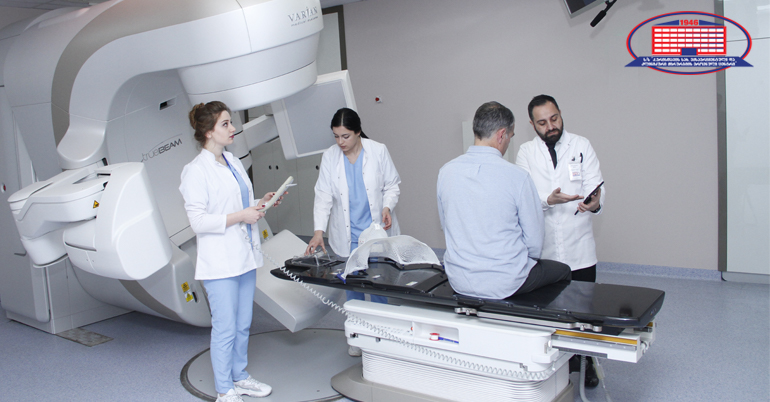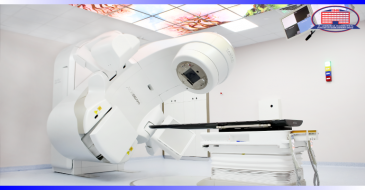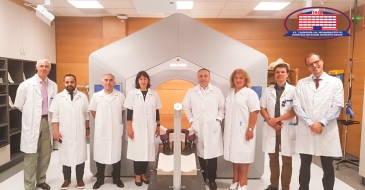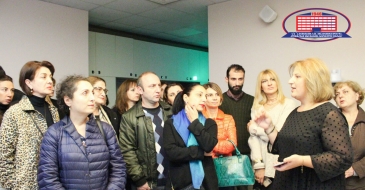
Representatives of the "Aversi" group's member-organizations visited the radiotherapy department of National Center of Surgery.
Guests viewed U.S company Varian’s ultramodern and maximally sophisticated, clinically equivalent (twin), latest linear accelerators
The clinic’s director general, Lasha Bazadze explained to the audience, what are the methods of treatment and diagnostics of oncologic patients and that based on Tumor Board’s joint discourse and discussion, treatment tactics are individually selected for each patient.
Mr. Bazadze states – “Specialists from various fields are involved in the process. It’s noteworthy that professor Natia Esiashvili, Emory University’s head of the quality unit of radiation oncology department and associate professor Maia Jughashvili – Hernandez, leading specialist at Spain Genesis Care’s multidisciplinary institution of oncology, member of public relations committee of ESTRO’s international radiation oncologists, associate professor of Murcia University, participate in treatment tactic and irradiation planning. Our clinic's linear accelerators are the latest generation, the year of 2019. Over the years we'd searched and found personnel – They were educated in the leading universities of the U.S and Europe. Each personnel of the radiotherapy department is guided by strictly defined international guidelines."
The director general informed guests about the news at the radiotherapy department. In particular, National Center of Surgery soon will be equipped with the very first digital positron-emission tomography (PET/CT) in Eastern Europe and the post-soviet union sphere.
As Mr. Bazadze explained, positron-emission tomography is a study method of the nuclear medicine, has no alternatives when it comes to cancer diagnostics and represents a golden standard in oncology. In 36% of the cases, it changes treatment tactics.
The presentation for the guests was prepared by radiation oncologists of the radiotherapy department, brachytherapists Irina Jobava and Lasha Goginashvili. During the presentation, oncologists reviewed several interesting clinical cases.
Control imaging examinations performed before and after the radiation therapy clearly demonstrates how effective this treatment method is.
It should be noted that radiation therapy in modern oncology is one of the main treatment methods that is necessary to use for min. 50% of the diseased people on different stages of the fight against cancer.
Radiation therapy impacts cancer locally to destroy cancer cells. It’s appointed to a patient in the radical (in order to be cured), neoadjuvant (for pre-operative preparation), adjuvant (as an assisting therapy in post-operative period) and palliative (for reducing the symptomatic caused by cancer and improving quality of life) regimes.
The innovative methods of treatment and diagnostics, ultramodern medical equipment – National Center of Surgery’s radiotherapy department ensures patient-individualized, medical evidence-based, high standard radiation therapy performance using modern technologies.
Following are conducted in the radiotherapy department: radiotherapy of central nervous system, head and neck, lungs, breast, gastrointestinal tract organs, urologic, gynecologic and oncologic diseases, lymphomas and hematologic cancers, bone and soft tissue, skin, brain and bone multiple metastasis using modern technologies of irradiation: 3DCRT 3 dimensional conformal, IMRT intensity-modulated, volumetric modulated VMAT (RapidArc), RGRT respiratory gated radiation therapy.
The daily procedure of the treatment is conducted with IGRT (image-guided radiotherapy) control that ensures high accuracy of the treatment plan fulfillment. Planning for each patient is conducted with the highest quality and in compliance with security norms.
The chemotherapy unit successfully functions at the radiotherapy department, where patients diseased with cancer are treated according to the latest international protocols and guidelines. Medication treatment for solid malignant cancers is conducted in the clinic's chemotherapy unit: chemotherapy, hormonotherapy, immune and targeted therapy in neoadjuvant, adjuvant and palliative regimes as a monotherapy, as well as polychemotherapy. Depending on the cancer type, stage of the disease and patient’s general condition, treatment is conducted in an out-patient or hospital conditions. Treatment tactic is chosen individually using a multidisciplinary approach for each patient, meaning specialists from various fields jointly take part in patient's diagnostics and treatment processes.
Since the establishment of the radiotherapy department in National Center of Surgery, many patients utilized high-quality medical assistance using qualified medical staff and ultramodern technologies.
National Center of Surgery address: Tbilisi, Dighomi, Chachava N5.
You may contact National Center of Surgery’s call-center at 577 119 119 or 2 02 25 25.
Wish you health!
















